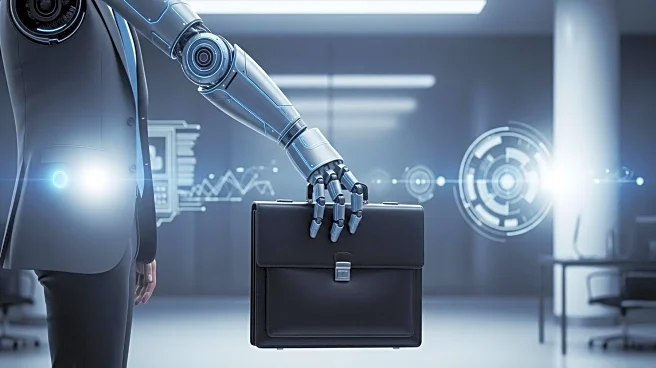What's Happening?
A report from the Senate Health, Education, Labor and Pensions Committee, led by Senator Bernie Sanders, has projected that artificial intelligence (AI) could potentially eliminate nearly 100 million jobs in the United States over the next decade. The report, which utilizes a ChatGPT-based analysis, highlights that both white- and blue-collar professions are at risk, with 89% of fast food jobs, 64% of accounting roles, and 47% of trucking positions potentially being automated. Senator Sanders has criticized the development of AI and robotics by billionaires, suggesting it is a strategy to cut labor costs and increase corporate profits at the expense of decent-paying jobs. The report also notes significant job losses at major companies like Amazon and Walmart due to automation.
Why It's Important?
The potential job losses due to AI pose a significant threat to the U.S. workforce, affecting both low- and high-skilled workers. This development could lead to increased economic inequality as jobs are automated, potentially leaving millions unemployed or underemployed. The report's findings highlight a growing divide between Democrats, who are advocating for measures to protect workers, and Republicans, who emphasize the importance of maintaining U.S. leadership in AI innovation. The proposed solutions, such as a 32-hour workweek, profit-sharing, and a 'robot tax,' aim to mitigate the economic disruption and ensure that the benefits of AI are more equitably distributed.
What's Next?
The report suggests implementing proactive policies to address the anticipated job displacement. These include reducing the standard workweek, introducing profit-sharing models, and taxing companies that replace human labor with robots. The debate over AI regulation is likely to intensify, with Democrats pushing for protective measures for workers, while Republicans may resist regulations that could hinder technological advancement. The outcome of this debate will significantly influence the future of the U.S. labor market and the role of AI in the economy.
Beyond the Headlines
The ethical implications of AI-driven job displacement raise questions about the responsibility of corporations in safeguarding employment and ensuring fair labor practices. The potential for increased economic disparity and social unrest could prompt a reevaluation of the social contract between employers and employees. Long-term, this shift may necessitate a transformation in education and training systems to prepare the workforce for new types of jobs that AI cannot perform.










